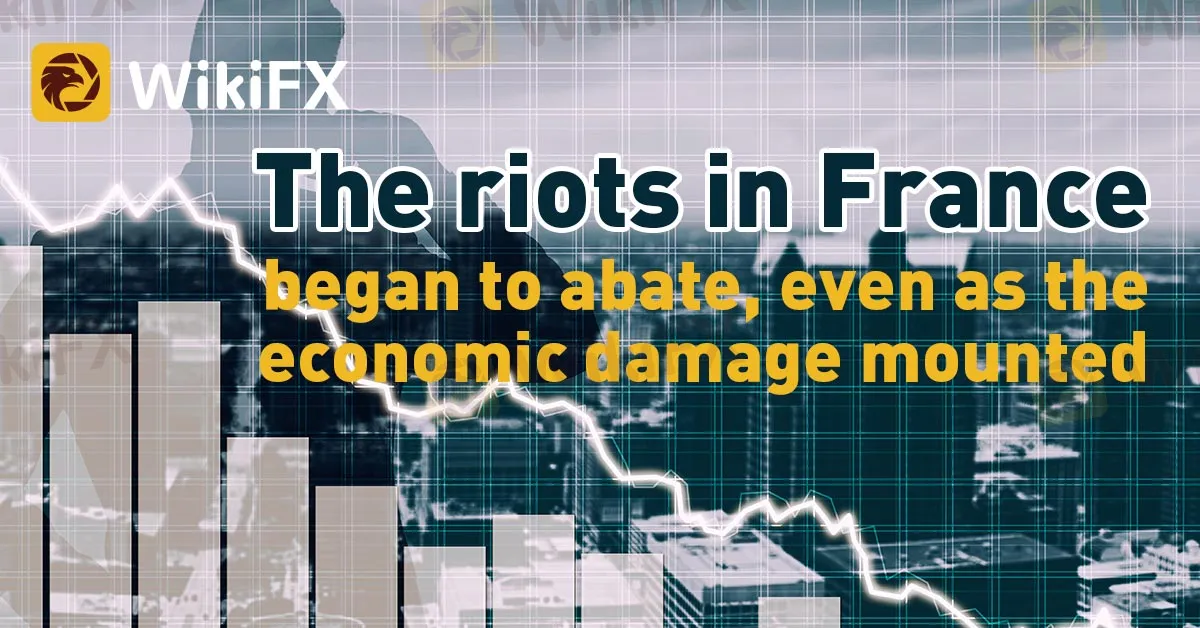简体中文
繁體中文
English
Pусский
日本語
ภาษาไทย
Tiếng Việt
Bahasa Indonesia
Español
हिन्दी
Filippiiniläinen
Français
Deutsch
Português
Türkçe
한국어
العربية
The riots in France began to abate, even as the economic damage mounted
Abstract:Recent riots in France, sparked by the tragic death of a teenager, while the initial days of protests were marked by clashes and looting, there are now indications of the situation gradually stabilizing. However, the economic costs of the unrest continue to mount, adding to the challenges faced by the French government.

Background
Recent riots in France, sparked by the tragic death of a teenager, while the initial days of protests were marked by clashes and looting, there are now indications of the situation gradually stabilizing. However, the economic costs of the unrest continue to mount, adding to the challenges faced by the French government.
Police Reinforcements to Restore Order
In response to the escalating unrest, French authorities deployed additional police reinforcements to quell the violence and restore order. The aim was to prevent further acts of looting, vandalism, and destruction of public and private property.
Economic Costs Mount
While the riots were fueled by social and political grievances, they also took a heavy toll on the French economy. The widespread disruption, including damage to infrastructure and businesses, resulted in significant economic costs. Industries such as retail, tourism, and transportation were particularly affected, leading to financial losses and job insecurity for many. Industries such as retail, tourism, and transportation have been particularly affected, leading to job losses and a decline in investor confidence. The forex market and global stock markets are also impacted negatively. The burden of rebuilding and recovering from the aftermath of the protests adds further strain to an already challenging economic landscape.
Government Response and Mitigation Efforts
Recognizing the severity of the situation, the French government has taken steps to address the concerns of the protestors. It has engaged in dialogues with labor unions, implemented measures to boost employment, and pledged to tackle wealth inequality. These efforts aim to restore social cohesion and alleviate the economic hardships faced by the population.
Global Impact and Lessons Learned
The French riots have not gone unnoticed on the global stage, with other nations closely observing the situation. The unrest has underscored the importance of inclusive economic policies, social welfare, and a responsive government.
Conclusion
While the economic costs of the French riots continue to mount, there are glimmers of hope as the protests begin to abate. The grievances that fueled the unrest remain valid, and there is still much work to be done to address them.

Disclaimer:
The views in this article only represent the author's personal views, and do not constitute investment advice on this platform. This platform does not guarantee the accuracy, completeness and timeliness of the information in the article, and will not be liable for any loss caused by the use of or reliance on the information in the article.
Read more

Will natural disasters have an impact on the forex market?
The forex market is known for its rapid responses to global events, but the influence of natural disasters, such as earthquakes and typhoons, can be less straightforward. While headlines may scream about catastrophic damage and economic disruption, the long-term effects on currency values often depend on a blend of immediate shock and underlying economic fundamentals.

Navigating the Intersection of Forex Markets, AI Technology, and Fintech
The financial world is transforming, driven by the rapid integration of artificial intelligence (AI) and innovative fintech solutions. This change is most apparent in forex markets, where algorithmic trading and deep learning are redefining strategies, risk management, and decision-making. In this article, we explore how AI-driven technologies are not only revolutionizing forex trading but are also propelling fintech innovations that enhance customer experiences, bolster security, and unlock new market opportunities.

The One Fear That’s Costing You More Than Just Profits
The fear of missing out (FOMO) is NOT what you think it is! Read the three lesser-discussed components that contribute greatly to FOMO trading!

SocialFi and the Forex Market: A New Era for Decentralized Social Trading?
The worlds of social media and decentralized finance (DeFi) have converged under a new banner—SocialFi. Short for “Social Finance,” SocialFi leverages blockchain technology to reward user engagement, giving individuals direct control over their data and interactions. While SocialFi has primarily emerged in the context of content creation and crypto communities, its principles could soon revolutionize the forex market by reshaping how traders share insights and monetize social influence.
WikiFX Broker
Latest News
FCA Warns Against 10 Unlicensed or Clone Firms
CySEC Warns Against 14 Unlicensed Investment Websites
Top Currency Pairs to Watch for Profit This Week - March 31, 2025
Will natural disasters have an impact on the forex market?
Philippines Deports 29 Indonesians Linked to Online Scam Syndicate in Manila
Exposing the Top 5 Scam Brokers of March 2025: A Closer Look by WikiFX
Gold Prices Climb Again – Have Investors Seized the Opportunity?
Webull Launches SMSF Investment Platform with Zero Fees
Australian Regulator Warns of Money Laundering and Fraud Risks in Crypto ATMs
AI-Powered Strategies to Improve Profits in Forex Trading
Currency Calculator







